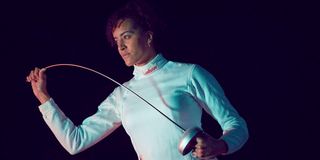Premium
T5 with Alexandra Ndolo

What you need to know:
- Starting out wasn’t hard. I got assistance from former Germany national coach Manfred Kapsar so all I had to do was move to Bonn, Germany.
- I hadn’t played fencing in my junior years so I didn’t have a ranking, and that made me somewhat unpopular because I was coming in at a time when everyone else already knew their capabilities.
Alexandra Ndolo has been involved in sports since she was a little child, and is a world champion in fencing. She has two European Championship medals, and a world championship silver medal which she won this April in Cairo. She was the first woman of colour to ever fence for Germany, and recently decided to start fencing in Kenya.
1. Why do you think it is important for you to switch your fencing representative country to Kenya?
I want to help make the Kenyan Fencing Federation stronger and more visible. By winning medals and showing how beautiful this sport is, I hope to inspire future generations to pick up the sport. We already have people who coach and fence, in Kenya,so I plan to come in as an advisor. A fencing player can only switch the country they play for once, so this is a big decision for me. I had to talk to the German Fencing Federation to allow me to leave, and then the Kenya Fencing Federation to accept and legitimise my move. The International Fencing Federation also had to give their approval.
2. What do you think needs to be done to get other Kenyan athletes to compete at your level?
Every international medal I have is special to me. I am happy to win it for myself, my family and now, for Kenya. Every competition I enter, I want to win, regardless of my previous success. We need to build a strong training group as well as permanent training facilities where we can also store our equipment.
3. What made you pick up the sport of fencing? Do people still think it is a strange type of sport?
Like most athletes, I got into sports when I was a child, but my way was different, in that I did track and field from the age of five, then afterwards I moved to modern pentathlon events (swimming, horseback riding, shooting, fencing, and running). At age 21, I decided to specialise in épée fencing (one of the three types of fencing).
Starting out wasn’t hard. I got assistance from former Germany national coach Manfred Kapsar so all I had to do was move to Bonn, Germany. I hadn’t played fencing in my junior years so I didn’t have a ranking, and that made me somewhat unpopular because I was coming in at a time when everyone else already knew their capabilities. Everyone said I was too old to start learning the game, and that I should have joined when I was 14, but they eventually embraced me.
4. Do you think it is important for children to pick up sports?
Certainly. Sport is good for your health and teaches you important values such as discipline and perseverance. Fencing is a really great sport where you can be creative. Give it your best.
5. What do you do when you're not fencing? If you weren't a world medalist in fencing, which career would you have explored?
When I am not training or competing, I like to spend time with friends and family. If I wasn’t a professional fencer, I would be an author and singer.


